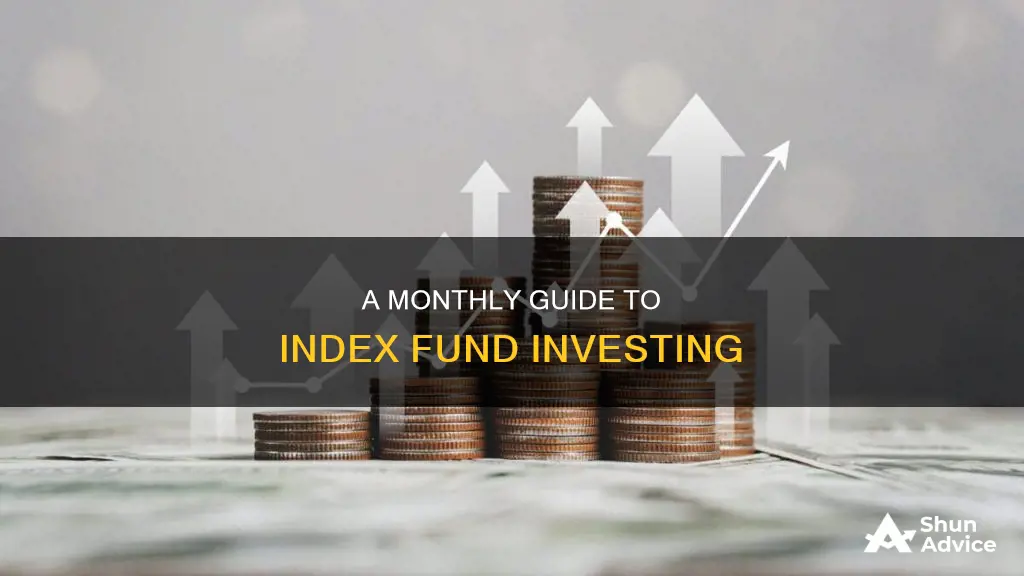
Index funds are a great way to build wealth over time, especially for retirement. They are a type of investment vehicle that aims to match the returns of a specific market index, such as the S&P 500 or the Russell 2000. By investing in index funds, individuals can gain exposure to various sectors and markets at a low cost. When compared to actively managed funds, index funds typically outperform them over the long run, making them a popular choice for investors. In this article, we will discuss how to invest in index funds on a monthly basis, including the steps to get started, the benefits, and the costs associated with this investment strategy.
| Characteristics | Values |
|---|---|
| What are index funds? | A group of stocks that aims to mirror the performance of an existing stock market index, such as the S&P 500. |
| How do they work? | Index funds don't try to beat the market but instead try to be the market by buying stocks of every firm listed on a market index. |
| Why invest in index funds? | Actively managed funds often underperform the market, while index funds match it. Passively managed index funds bring better returns over the long term and at a lower cost. |
| How much do they cost? | Index funds have an expense ratio, which is a fee subtracted from each fund shareholder's returns as a percentage of their overall investment. They may also have investment and account minimums. |
| Diversification | Index funds are available across a variety of asset classes, allowing investors to buy funds that focus on companies with different market capitalisations, sectors, and geographies. |
| How to invest | Decide on a goal, research different funds, pick your funds, decide where to buy them, purchase shares of the fund in an investment account, and keep an eye on the fund's performance. |
What You'll Learn

Index funds vs. ETFs
Index funds and ETFs (exchange-traded funds) are similar in many ways. Both are investment vehicles that aim to match the returns of a specific market index, such as the S&P 500. They are also both passively managed, meaning they track an index rather than trying to outperform it. This passive strategy has paid off in the long term, with the S&P 500 earning a little over 10% annually since 1928.
However, there are some key differences between the two. ETFs can be bought and sold throughout the trading day, like stocks, whereas index funds can only be bought and sold at the end of the day. ETFs are also more transparent, typically offering daily portfolio disclosures, while index funds only release details on specific investments monthly or quarterly.
ETFs are generally considered more tax-efficient than index funds. ETFs use an "in-kind" creation and redemption process, which minimises capital gains distributions. On the other hand, mutual funds may generate capital gains when the fund manager sells holdings to meet redemptions, potentially leading to a tax liability for investors even if they haven't sold their shares.
ETFs also tend to have lower fees. While both types of funds charge shareholders an annual fee called an expense ratio, the average expense ratio for index funds was 0.05% per year in 2023, compared to 0.15% for ETFs. However, with ETFs, you may also owe a trading commission, a flat fee each time you buy or sell.
Another distinction is that ETFs generally do not require a minimum initial investment, whereas index funds often do.
Finally, ETFs are usually not an investment option through workplace retirement plans, so if you want to invest through your employer, you may need to stick with index funds.
A Beginner's Guide to Mutual Fund Investing in Europe
You may want to see also

Choosing the right index fund
Index funds are a great investment for building wealth over time, especially for retirement. They are a type of investment vehicle that aims to match the returns of a specific market index.
When choosing the right index fund, it's important to consider your personal situation and goals. Ask yourself: When do you want to retire and how far away is that milestone? What does your risk tolerance and budget look like?
Company size and capitalization
Index funds can track small, medium, or large companies, also known as small-, mid-, or large-cap indexes.
Geography
Consider whether you want to focus on domestic or international stocks. There are funds that invest in companies that trade on foreign exchanges or a combination of international exchanges.
Business sector or industry
You can choose funds that focus on specific sectors, such as consumer goods, technology, or health-related businesses.
Asset type
Different funds track different types of assets, such as bonds, commodities, or cash.
Market opportunities
These funds focus on emerging markets or other growing sectors.
Costs and fees
Index funds are typically cheaper to run than other funds because they are automated to follow the shifts in value in an index. However, they still carry administrative costs, which are usually charged as a percentage of the overall investment. Compare the expense ratios of different funds, as these costs can add up over time.
Additionally, consider the fund's investment minimum, which is the minimum required to invest in the fund, and the account minimum, which is the minimum required to open an account with the brokerage or fund company.
Performance
While index funds don't require active management, you should still monitor their performance to ensure they are doing their job. Compare the fund's returns with the performance of the benchmark index it tracks. Don't panic if the returns aren't identical, as fees and taxes will affect the results. However, if the fund's performance lags the index by more than the expense ratio, it may be cause for concern.
Liquidity and trading costs
Larger funds typically offer more liquidity and lower trading costs. Consider how easy it would be to liquidate your investment if needed. Additionally, compare the trading costs or transaction fees charged by different brokers or fund companies.
Impact investing
If you want your investment to align with your values, consider funds that target companies with a focus on environmental or social justice causes.
Remember, the key is to have a strategy that works for your financial goals while minimizing costs. By researching and comparing different index funds, you can choose the right one for your investment portfolio.
A Guide to Index Fund Investing in Australia
You may want to see also

Costs and fees
Index funds are a low-cost investment option, but there are still some fees to be aware of. Here are the key costs and fees to consider when investing in index funds:
- Investment minimums: The minimum amount required to invest in an index fund can vary from nothing to a few thousand dollars. This is the initial investment required to purchase shares of the fund.
- Account minimums: This is different from the investment minimum and refers to the minimum balance required to open an investment account, such as a brokerage account, IRA, or Roth IRA.
- Expense ratio: This is one of the main costs associated with index funds. The expense ratio is an annual fee charged by the fund, expressed as a percentage of your total investment. It covers the fund's operating expenses, such as management fees, marketing, and administrative costs. The expense ratio is important because it can eat into your investment returns over time.
- Trading costs: When buying or selling index funds, there may be transaction fees or commissions charged by the broker or fund company. These fees can vary depending on the broker and the type of fund. For example, mutual fund commissions are typically higher than stock trading commissions.
- Management fees: Some index funds may charge an annual management fee for selling shares of the fund. This is separate from the expense ratio and is typically charged by actively managed funds.
- Taxes: Investing in index funds may trigger capital gains taxes, especially if the funds are held outside of tax-advantaged accounts such as a 401(k) or IRA. The tax-cost ratio measures the impact of taxes on your investment returns.
When investing in index funds, it's important to carefully review the fees and costs associated with the fund. Even small differences in fees can add up over time and impact your investment returns. Additionally, consider the size of the fund, as larger funds tend to have lower fees. By minimizing costs and fees, you can maximize your investment returns over the long term.
Robo Advisors: Index Fund Investing Strategies Explored
You may want to see also

Where to buy index funds
When deciding where to buy your index funds, you have two choices.
First, you'll need to choose a brokerage. Charles Schwab, Fidelity and Vanguard are some of the biggest brokerages where a do-it-yourself investor can open an account. You can also use a robo-advisor, like Betterment, which offers fully automated index-fund investing through ETFs. These companies, known as robo-advisors, only use index funds, with allocations determined by factors such as an investor's time horizon and risk tolerance. The larger brokerages also offer robo-advisor options that may invest in index or active funds.
Second, you'll need to decide what kind of account to use for your index funds. You can hold an index fund in either a taxable brokerage account or a qualified, tax-advantaged vehicle such as an individual retirement account (IRA) or 401(k) plan. The location of these assets depends on your investment goals.
Sharekhan's Guide to Mutual Funds Investing
You may want to see also

How index funds work
Index funds are a type of investment vehicle that aims to mirror the performance of a specific market index, such as the S&P 500, by holding the same stocks or bonds or a representative sample of them. They are defined as passive investments, which means they are not actively managed by fund managers. Instead, they track a specific market index and aim to match its performance. This makes them a low-cost way to gain exposure to a broad and diversified portfolio.
Index funds are typically mutual funds or exchange-traded funds (ETFs) that pool money from many investors to invest in the securities that make up the index. For example, an S&P 500 index fund will generally hold the same 500 companies that the S&P 500 index represents. If the S&P 500 drops one company out of the index, the S&P 500 index fund would then sell the company that's being dropped and buy the security of the one that's being included. This passive management style keeps costs low, as there is less buying and selling of securities, which triggers taxable events.
The main advantage of index funds is their low cost compared to actively managed funds. Because they are passively managed, they have lower expense ratios, and the managers do not need to conduct as much research or trading. This means they can charge lower fees, typically around 0.04% compared to 0.44% or more for actively managed funds.
Index funds also offer broad market representation, as they aim to mirror the performance of a specific index. This provides investors with a diversified investment that tracks overall market trends. The transparency of index funds is another benefit, as the holdings are well-known and available on investing platforms.
Additionally, index funds have historically outperformed actively managed funds over the long term, especially after accounting for fees and expenses. This is because actively managed funds often underperform their benchmarks, and the higher fees and trading expenses tilt the scales in favour of passive funds.
However, one of the critiques of index funds is their lack of flexibility. Because they are designed to mirror a specific market, they decline in value when the market does, and they cannot pivot away when the market shifts. They are also criticised for automatically including all the securities in an index, which may include overvalued or weak companies.
Overall, index funds are a popular choice for investors seeking low-cost, diversified, and passive investments. While they offer advantages such as lower risk through diversification and solid long-term returns, they are also subject to market swings and lack the flexibility of active management.
Life Investment Funds: Your Best Long-Term Investment Option
You may want to see also
Frequently asked questions
An index fund is a group of stocks that aims to mirror the performance of an existing stock market index, such as the Standard & Poor’s 500 index. An index is made up of companies that represent a part of the financial market and offers a look into the health of the economy as a whole.
The key to investing in an index fund is to have a strategy that works for you while minimising costs. It's important to do your research and consider factors such as the fund's size, fees, liquidity, and investment goals.
You can buy an index fund directly through an index fund provider like Vanguard or Fidelity, or through other brokerage accounts and certain investment apps.
The minimum required to invest in an index fund varies and can range from nothing to a few thousand dollars. The amount you contribute monthly will depend on your investment goals and risk tolerance.
Index funds are a great investment for building wealth over the long term, especially for beginners and retirement investors. They are typically low-cost, well-diversified, and provide better returns than actively managed funds over time.







